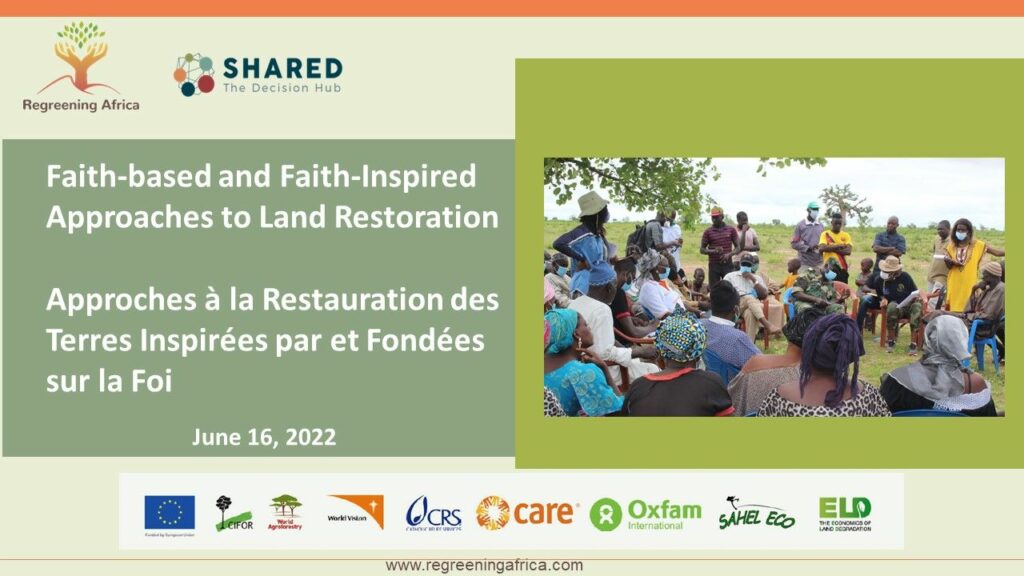Faith in land restoration: lessons and insights
By *Sandiso Matshikiza
The ecological and socio-economic effects of climate change and land degradation are now well documented across the globe, with many initiatives that seek to address these issues putting researchers and scientists from the relevant disciplines at the forefront of their work. The spiritual consequences of land degradation are however often overlooked: for people of faith, this dimension can be just as significant as the ecological or socioeconomic. Faith therefore has the potential to be a powerful motivator of environmental stewardship, which makes it important to combine science and faith to establish faith-based approaches to land restoration. A recent cross thematic discussions convened by the SHARED (Stakeholder Approach to Risk Informed and Evidence Based Decision Making) approach within Regreening Africa, sought to do just this by gathering landowners, farmers, and community leaders whose land restoration practices are rooted in faith, to help raise awareness about how we can better address the impact of land degradation through a faith-based lens.

The first fresh insight drawn from this engagement is that faith-based approaches to land restoration deepen a collective understanding that we are connected to the earth and can only thrive if it thrives. During the discussion, leaders from different backgrounds of faith quoted passages from various scriptures that share the common belief that the earth has been given to us by God to protect, and that land degradation and the unsustainable use of natural resources therefore have consequences. Beyond seeing the nurturing of creation and the growing of trees as acts of worship, faith-based approaches also promote understanding that land restoration is a powerful way to improve livelihoods, food security, and climate change resilience.
In terms of the role of faith institutions in land restoration initiatives, it was noted that spiritual leaders and faith institutions play an important role in land restoration movements due to their influence and resources. In many countries, faith institutions are critical implementation partners who can mobilize, raise awareness and inspire behaviour change with great ease, as they are trusted by communities. As one leader pointed out during the discussion, in highly religious countries such as Niger, Somalia and Senegal, efforts to solidify and scale regreening initiatives would fail without the consultation and support of faith institutions.
Spiritual leaders and faith institutions also play an important role as stewards of peace through land restoration. A significant amount of the conflict that arises on the African continent is related to security and resources which come from land. When climate change and land degradation worsen, such conflicts also tend to increase. However, faith-based approaches provide a unique solution to this issue, pointing to specialized initiatives such as ‘’peace tree’’growing initiatives, which can help to restore land and security.
Finally, faith institutions have a vast wealth of resources that can be leveraged to establish on-the-ground partnerships for land restoration. One of the key opportunities that was highlighted in this discussion was the potential of places of worship and other church-owned infrastructure to serve as tree nurseries and spaces to promote environmental stewardship.
Faith communities have been ignored in development initiatives for too long. When we start to view all members of society as stakeholders who are affected by major present-day issues like land degradation, we can also begin to see them as stakeholder who can contribute varied but specialized solutions to these issues.
Materials from the session:
- Session recording in English
- Session recording in French
- An interview with Imam Mohamed Ashafa and Pastor James Wuye conducted in 2021 at Karura forest in Kenya: Role of religious leaders in environmental conservation
A version of this article has also been published in Forest News.
*Sandiso Matshikiza is a project manager with Treeshake
This story was produced with the financial support of the European Union. Its contents are the sole responsibility of Regreening Africa and do not necessarily reflect the views of the European Union.

